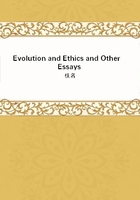
第17章
I have pointed out that human society took its rise in the organic necessities expressed by imitation and by the sympathetic emotions; and that, in the struggle for existence with the state of nature and with other societies, as part of it, those in which men were thus led to close co-operation bad a great advantage.But, since each man retained more or less of the faculties common to all the rest, and especially a full share of the desire for unlimited self-gratification, the struggle for existence within society could only be gradually eliminated. So long as any of it remained, society continued to be an imperfect instrument of the struggle for existence and, consequently, was improvable by the selective influence of that struggle. Other things being alike, the tribe of savages in which order was best maintained; in which there was most security within the tribe and the most loyal mutual support outside it, would be the survivors.
Collected Essays, vol. v., Prologue, p. 52.
I have termed this gradual strengthening of the social bond, which, though it arrest the struggle for existence inside society, up to a certain point improves the chances of society, as a corporate whole, in the cosmic struggle--the ethical process. I have endeavoured to show that, when the ethical process has advanced so far as to secure every member of the society in the possession of the means of existence, the struggle for existence, as between man and man, within that society is, ipso facto, at an end. And, as it is undeniable that the most highly civilized societies have substantially reached this position, it follows that, so far as they are concerned, the struggle for existence can play no important part within them.In other words, the kind of evolution which is brought about in the state of nature cannot take place.
Whether the struggle for existence with the state of nature and with other societies, so far as they stand in the relation of the state of nature with it, exerts a selective influence upon modern society, and in what direction, are questions not easy to answer. The problem of the effect of military and industrial warfare upon those who wage it is very complicated.
I have further shown cause for the belief that direct selection, after the fashion of the horticulturist and the breeder, neither has played, nor can play, any important part in the evolution of society; apart from other reasons, because I do not see how such selection could be practised without a serious weakening, it may be the destruction, of the bonds which hold society together. It strikes me that men who are accustomed to contemplate the active or passive extirpation of the weak, the unfortunate, and the superfluous; who justify that conduct on the ground that it has the sanction of the cosmic process, and is the only way of ensuring the progress of the race; who, if they are consistent, must rank medicine among the black arts and count the physician a mischievous preserver of the unfit; on whose matrimonial undertakings the principles of the stud have the chief influence; whose whole lives, therefore, are an education in the noble art of suppressing natural affection and sympathy, are not likely to have any large stock of these commodities left. But, without them, there is no conscience, nor any restraint on the conduct of men, except the calculation of self-interest, the balancing of certain present gratifications against doubtful future pains; and experience tells us how much that is worth. Every day, we see firm believers in the hell of the theologians commit acts by which, as they believe when cool, they risk eternal punishment; while they hold back from those which am opposed to the sympathies of their associates.